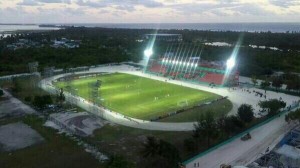The Maldives must empower anti-corruption agencies to investigate and prosecute cases in order to fight corruption, says Transparency International.
“Maldives and Sri Lanka must ensure that their anti-corruption agencies are granted ‘suo motto’ powers to instigate both corruption investigations and prosecutions on their own initiative without prior government approval,” suggested the Fighting Corruption in South Asia (FCSA) report released today.
At present, the Maldives Anti Corruption Commission (ACC) can only initiate investigations, but not prosecutions. Instead, it has to forward cases to the Prosecutor General for any further action to be taken.
Analysing 70 institutions across 6 countries, the anti-corruption NGO concluded that a “serious lack of political will on the part of governments to make laws work” was hampering the regional fight against corruption.
The report also called on the government to enforce the Right to Information Law and ensure protection of whistleblowers.
Independence and Accountability
Although the report advocated greater independence for oversight bodies, it highlighted the need to balance independence with accountability.
Too much of either can lead to abuse of power, the report noted, arguing limited judicial accountability has resulted in the Maldives Supreme Court exerting excessive use of power over other branches of government.
One example that the FCSA uses to demonstrate their findings is the Maldives Supreme Court’s much-criticised decision to convict the president of the Elections Commission Fuwad Thowfeek for contempt of court earlier this year. The apex court acted as prosecutor, judge and jury during the trial.
The Maldivian Anti Corruption Commission itself has raised concerns over a Supreme Court rulings, in which the apex court ruled the body does not have the authority to prevent the state from entering into questionable contracts.
ACC President Hassan Luthfee has said a ruling on a legal battle involving Department of Immigration, the Anti-Corruption Commission (ACC), and Malaysian IT firm Nexbis in 2012 had rendered the organisation powerless.
“If this institution is simply an investigative body, then there is no purpose for our presence,” he said.
“Even the police investigate cases, don’t they? So it is more cost effective for this state to have only the police to investigate cases instead of the ACC,” Luthfee said.
Referring the court’s, Luthfee said the ACC had no power to prevent corruption, arguing that anti-corruption bodies in other countries had powers of investigation, prevention, and awareness raising.
“If an institution responsible for fighting corruption does not have these powers then it is useless,” he said.
Right to Information
Another key finding highlighted in the FCSA report was what it regarded as the weak implementation of the Freedom of Information act, ratified earlier this year.
“In Maldives, although the new law has only just been passed, there are concerns about the level of citizens’ awareness of their rights, an issue which will need to be addressed as a matter of urgency,” the report states.
Under the act, an appointed commissioner has the power enforce a fine on information officers who deliberately refuse access to information. The President’s Office has today called for applications for the post which must be filled by mid July according to the new law.
The FCSA report categorises both the Maldives’ capacity to implement the law, and citizens’ awareness of the law as “weak”.
Additionally, the report highlighted the safety and protection of whistleblowers as a being major barrier to anti-corruption activities in the Maldives.
Noting the Right to Information Act provides protection to whistleblowers, the FCSA report called for more comprehensive whistleblower legislation with a broader scope covering both the public and private sectors.
Aiman Rasheed, Advocacy and Communications Manager at local Transparency branch Transparency Maldives said one the key findings of the report was the reversal of judicial reform after the February 2012 transfer of power.
“We had a new government set up. It was a positive environment. That has been reversed,” Aiman said.
He noted a “huge gap” between current systems and practices as politicians enjoyed an atmosphere of impunity following the controversial removal of President Mohamed Nasheed.
He went on to note that public engagement in holding officials accountable have been hindered by the lack of public debate in the local media.
“We have published a lot of reports on the public opinions of corruption, but we don’t see these being discussed in the media,” Aiman said.
 (0)Dislikes
(0)Dislikes (0)
(0)
